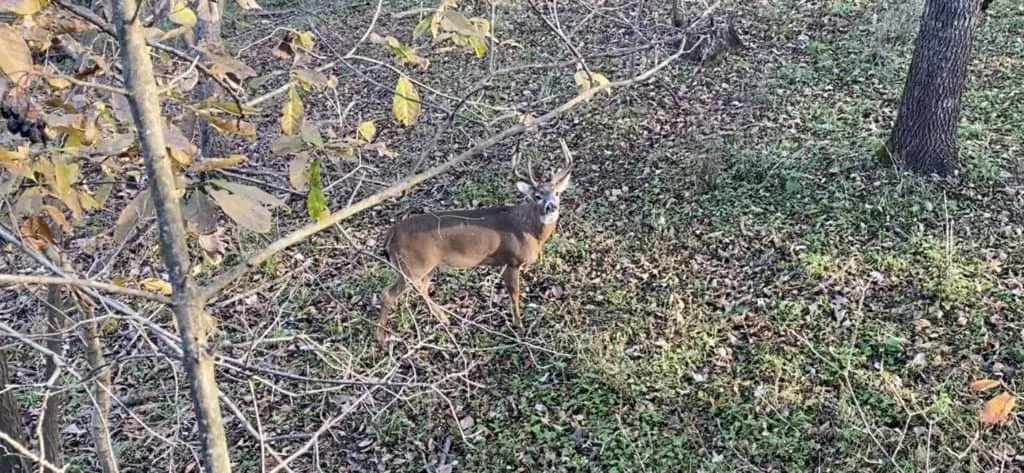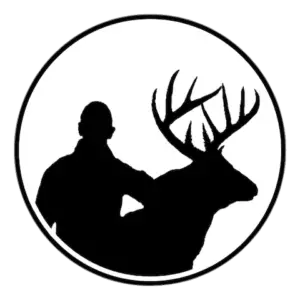Do you see fewer and fewer deer as hunting season passes along? Many whitetail hunters face this problem repeatedly every year, which leads them to ask a very important question in the deer hunting world. Do deer know that I’m hunting them?
Deer may not understand that they are being hunted, however they will change their behaviors and movement patterns due to human pressure that’s out of the norm from their daily and weekly observations. Deer adapt to their environments incredibly well and have a keen sense of awareness if anything out of the unfamiliar happens within their environment.
In this article we are going to talk about how deer might know they are being hunted, how you can recognize it, and how to prevent them from knowing they are being hunted. As you read along, please remember that deer respond to anything that isn’t a normal day-to-day interaction within their environment. Alright, let’s dive in.
How deer might know they are being hunted
Deer use their senses at all times to detect predators, hunters included. If deer can see, hear, or smell something out of the norm then they are going to be alerted to danger and respond accordingly. There are always variables like terrain and windspeed where deer won’t have the right conditions to hear, see or smell you very easily. However, let’s review how each of these senses work for deer to detect predators.
A deer’s sense of smell is out of this world. They don’t need to hear you or see you to get spooked from an area. All they need is one sniff of your scent. As a general rule, if the wind is blowing to the deer from your direction, then you should assume those deer are probably catching your wind and can smell you.
When it comes to a deer’s hearing ability they can hear just about the same as a human can. Any sound that is unusual in a deer’s environment is going to alert them of danger. An example of this could be you accidentally bumping a weapon against your tree stand and making a metal thump sound.
Deer can spot predators very well but they cannot see very good when it comes to making out stationary objects at a long distance. Humans are much better at this than deer are. However, deer vision is incredibly good when it comes to detecting movement and being able to see in low light conditions. This advantage helps them avoid predators very well throughout the day and nighttime hours.

How to recognize when deer react to hunting pressure
There are a few clues that can help you recognize when deer feel threatened. The obvious ones are deer blowing or snorting at you, or stomping a front foot abruptly against the ground. Deer will let you know through their body language when they feel threatened. How they use their tail, ears and head will all help you understand just how threatened they feel.
Individual deer respond differently to danger based on their specific personality types. If you walk by and see a bedded deer they may not move and will just stay laying down as they watch what your next move is. Other deer might run off immediately, regardless of whether or not you are hunting them. If one deer runs away then most likely any deer close by will follow their lead and run away with them.
You can recognize when deer react to hunting pressure without even seeing them spook in person. If you are a hunter and the quality of your hunts seem to dwindle as hunting season passes by then you can assume the deer have caught on to your hunting pressure. Human intrusion from hunters is a common reason for deer changing their bedding areas or movement patterns.
An easy way to confirm if deer are avoiding an area because of hunting pressure is by tracking the frequency of deer movements with a trail camera. Use a trail camera to monitor deer throughout the entire hunting season and perhaps a few months leading up to it. If the number deer pictures decrease from month to month throughout hunting season this is a good indicator that deer are responding to your hunting pressure.
How to keep deer from knowing they are being hunted
The only way to keep deer from knowing they are being hunted is by not letting them ever hear, see, or smell you. If you are intruding on a deer’s environment they might relocate and use a different property even if you aren’t hunting them. Deer will shift bedding areas and movement patterns if your intrusions with them aren’t regular day-to-day or week-to-week interactions.
Most of us reading this article are not spending every day or week in a deer’s environment. In order to keep deer from knowing they are being hunted you need a good hunting strategy that manages your sight, scent, and sound. It also helps if you are able to manipulate the habitat where you are hunting. If you are a landowner, or someone that can manipulate the habitat on the property you hunt, then consider reading my article about how to set up a property for deer hunting. This will increase your odds of knowing where deer spend most of their time on the landscape and how they typically move throughout the property where you hunt.
Even if you do everything correctly in regards to your hunting strategy and manipulation of habitat, you probably won’t prevent every deer from learning about your hunting pressure. However, you can cut down on it drastically to improve the overall quality of your hunts.
Try to do all of the little things you can to keep the deer from learning about your hunting pressure. Make sure all of your equipment is silent such as tree stands and clothing. Walk slowly and quietly to your hunting spots and try to use terrain features and habitat to your advantage to stay hidden from deer. Lastly, always hunt when the wind is blowing in a favorable direction where deer are not likely to be.
Conclusion
Do deer know when they are being hunted? Maybe not. However, they are absolutely alerted when something or someone comes into their environment that is out of the norm. Deer are a prey species so they will avoid areas, or use them cautiously, when there is a known potential threat of a predator being around. Deer will commonly change bedding areas and how they traverse throughout the landscape based on any threats that they recently encountered.
You can confirm any suspicions you might have of deer avoiding hunting pressure, or human intrusion in general, by using a trail camera. If the number of deer sighting go down over the course of a deer season, then chances are that you’re putting too much human intrusion on the deer herd. Change your hunting strategy and do what you can to manipulate the habitat so that you can enjoy better hunting opportunities.
If you are reading this article because you suspect that hunting pressure is ruining your chances of killing big bucks consistently, consider hiring a land and habitat consultant.


